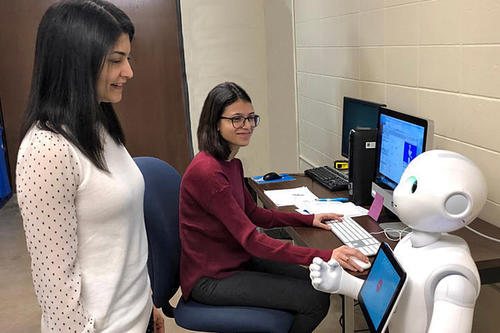
It’s seems a little strange, calling such an appealing helpmate “it,” but Pepper the robot doesn’t mind at all.
In researcher Arshia Khan’s lab, Pepper is being programmed as a personal caregiving assistant for persons with mild cognitive impairment. When put in service, Pepper will help those in its care go about their daily lives by monitoring vital signs and behavior, and talking to them much as a living, breathing caregiver would. It can even make eye contact and provide a sense of comfort, as if it were watching over a person.
“Pepper is designed specifically to make people happy, enhance lives, and facilitate relationships,” says Khan, an associate professor of computer science at UMN Duluth. To help ensure this, Kahn’s graduate student Yumna Anwar is studying people’s emotional responses to the robot.
Standing about four feet tall, Pepper uses cameras and sensors to detect a person’s facial expression, tone of voice, body movements, and gaze, all relayed through a special wireless watch worn by the person. Pepper can take many actions, such as sending an alert for a caregiver to check for bed sores. Air temperature, inside and out, can be tracked and watched for conditions that would lead to freezing or overheating. And, in an area of great concern for loved ones, Pepper can watch for wandering.
- Categories:
- Science and Technology





